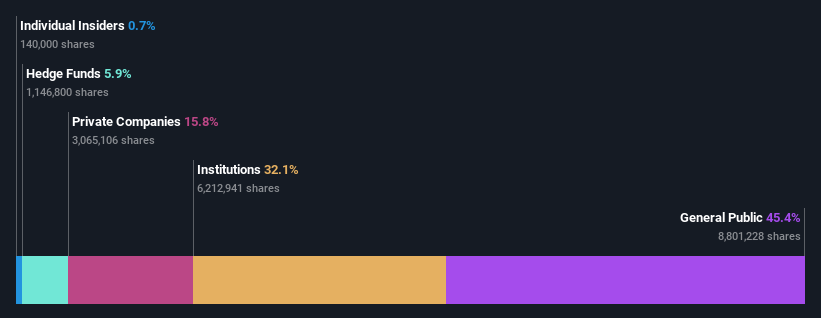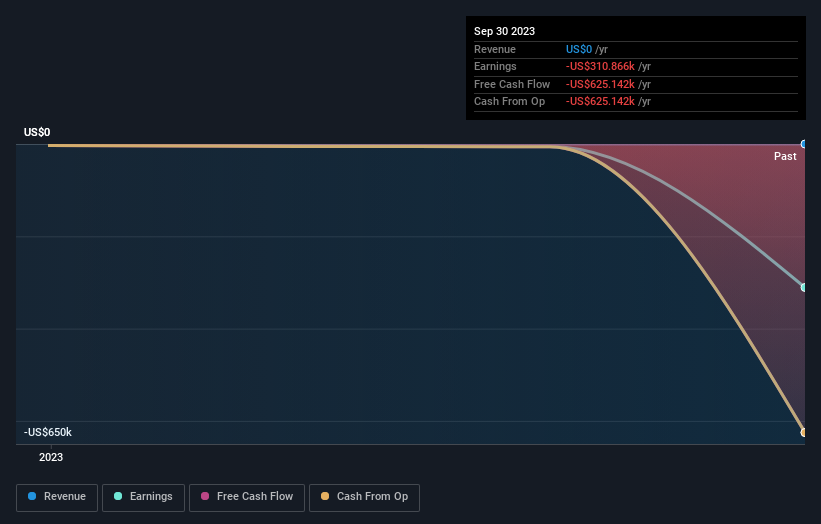Keen Vision Acquisition Corporation (NASDAQ:KVAC) most popular amongst retail investors who own 45% of the shares, institutions hold 32%
Key Insights
Keen Vision Acquisition's significant retail investors ownership suggests that the key decisions are influenced by shareholders from the larger public
50% of the business is held by the top 19 shareholders
To get a sense of who is truly in control of Keen Vision Acquisition Corporation (NASDAQ:KVAC), it is important to understand the ownership structure of the business. We can see that retail investors own the lion's share in the company with 45% ownership. Put another way, the group faces the maximum upside potential (or downside risk).
And institutions on the other hand have a 32% ownership in the company. Large companies usually have institutions as shareholders, and we usually see insiders owning shares in smaller companies.
Let's delve deeper into each type of owner of Keen Vision Acquisition, beginning with the chart below.
Check out our latest analysis for Keen Vision Acquisition
What Does The Institutional Ownership Tell Us About Keen Vision Acquisition?
Institutions typically measure themselves against a benchmark when reporting to their own investors, so they often become more enthusiastic about a stock once it's included in a major index. We would expect most companies to have some institutions on the register, especially if they are growing.
Keen Vision Acquisition already has institutions on the share registry. Indeed, they own a respectable stake in the company. This implies the analysts working for those institutions have looked at the stock and they like it. But just like anyone else, they could be wrong. When multiple institutions own a stock, there's always a risk that they are in a 'crowded trade'. When such a trade goes wrong, multiple parties may compete to sell stock fast. This risk is higher in a company without a history of growth. You can see Keen Vision Acquisition's historic earnings and revenue below, but keep in mind there's always more to the story.
It would appear that 5.9% of Keen Vision Acquisition shares are controlled by hedge funds. That worth noting, since hedge funds are often quite active investors, who may try to influence management. Many want to see value creation (and a higher share price) in the short term or medium term. KVC Sponsor LLC is currently the company's largest shareholder with 16% of shares outstanding. Meanwhile, the second and third largest shareholders, hold 5.9% and 4.6%, of the shares outstanding, respectively.
After doing some more digging, we found that the top 19 have the combined ownership of 50% in the company, suggesting that no single shareholder has significant control over the company.
While studying institutional ownership for a company can add value to your research, it is also a good practice to research analyst recommendations to get a deeper understand of a stock's expected performance. We're not picking up on any analyst coverage of the stock at the moment, so the company is unlikely to be widely held.
Insider Ownership Of Keen Vision Acquisition
The definition of an insider can differ slightly between different countries, but members of the board of directors always count. Company management run the business, but the CEO will answer to the board, even if he or she is a member of it.
Insider ownership is positive when it signals leadership are thinking like the true owners of the company. However, high insider ownership can also give immense power to a small group within the company. This can be negative in some circumstances.
Our data suggests that insiders own under 1% of Keen Vision Acquisition Corporation in their own names. We do note, however, it is possible insiders have an indirect interest through a private company or other corporate structure. It has a market capitalization of just US$201m, and the board has only US$1.5m worth of shares in their own names. Many tend to prefer to see a board with bigger shareholdings. A good next step might be to take a look at this free summary of insider buying and selling.
General Public Ownership
The general public, who are usually individual investors, hold a 45% stake in Keen Vision Acquisition. This size of ownership, while considerable, may not be enough to change company policy if the decision is not in sync with other large shareholders.
Private Company Ownership
We can see that Private Companies own 16%, of the shares on issue. It's hard to draw any conclusions from this fact alone, so its worth looking into who owns those private companies. Sometimes insiders or other related parties have an interest in shares in a public company through a separate private company.
Next Steps:
It's always worth thinking about the different groups who own shares in a company. But to understand Keen Vision Acquisition better, we need to consider many other factors. Case in point: We've spotted 3 warning signs for Keen Vision Acquisition you should be aware of.
Of course this may not be the best stock to buy. Therefore, you may wish to see our free collection of interesting prospects boasting favorable financials.
NB: Figures in this article are calculated using data from the last twelve months, which refer to the 12-month period ending on the last date of the month the financial statement is dated. This may not be consistent with full year annual report figures.
Have feedback on this article? Concerned about the content? Get in touch with us directly. Alternatively, email editorial-team (at) simplywallst.com.
This article by Simply Wall St is general in nature. We provide commentary based on historical data and analyst forecasts only using an unbiased methodology and our articles are not intended to be financial advice. It does not constitute a recommendation to buy or sell any stock, and does not take account of your objectives, or your financial situation. We aim to bring you long-term focused analysis driven by fundamental data. Note that our analysis may not factor in the latest price-sensitive company announcements or qualitative material. Simply Wall St has no position in any stocks mentioned.

 Yahoo Finance
Yahoo Finance 

